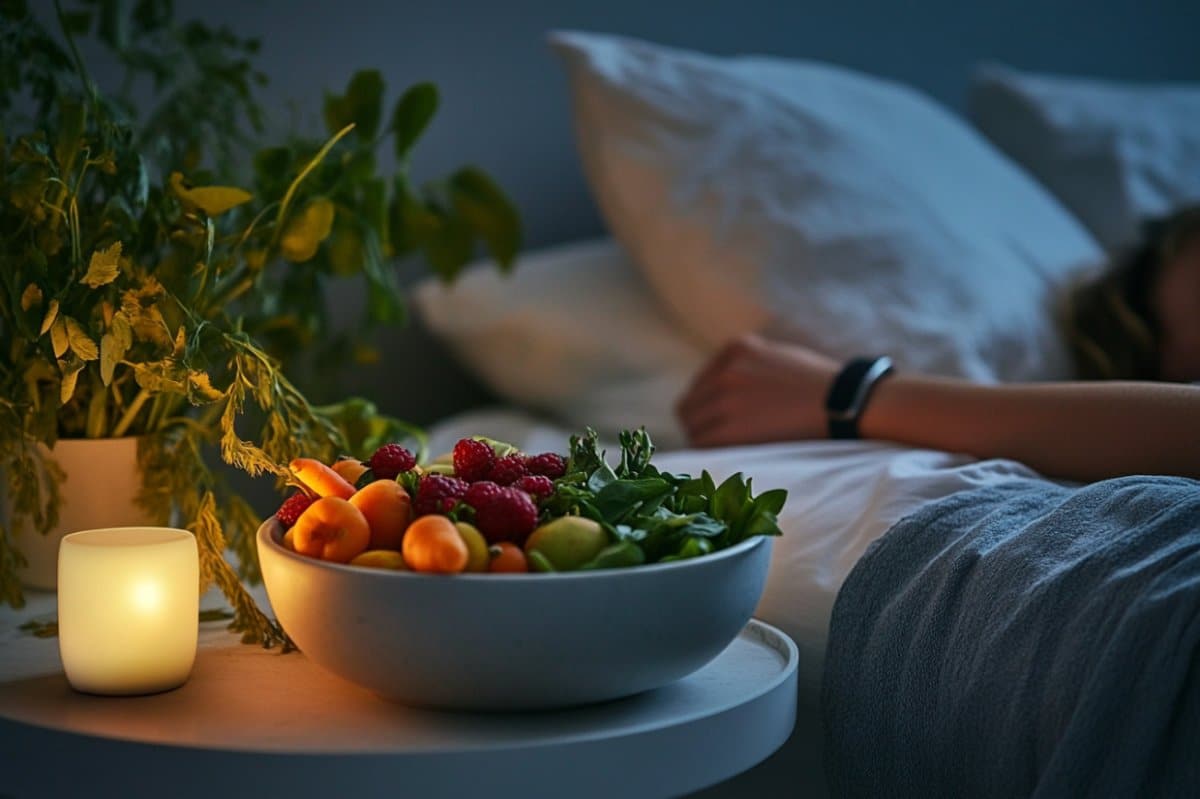Summary: A new study finds that eating more fruits and vegetables during the day is linked to improved sleep quality that same night. Researchers discovered that participants who consumed more produce experienced fewer sleep disruptions, including less waking and shallower sleep.
Objective wrist monitor data showed a clear association between healthy dietary patterns and better nightly rest. These findings suggest that simple dietary changes could be a powerful and natural tool for enhancing sleep health.
Key Facts:
- Immediate Impact: Eating more fruits and vegetables in a day improves sleep quality that same night.
- Objective Evidence: Sleep fragmentation was reduced in participants who followed CDC dietary recommendations.
- Powerful Effect: Consuming the recommended five cups of fruits and vegetables was associated with a 16% improvement in sleep quality.
Source: University of Chicago
From counting sheep to white noise and weighted blankets, people have tried innumerable ways to get a good night’s sleep.
Sleep disruptions can have far-reaching negative consequences, impacting cardiovascular and metabolic health, memory, learning, productivity, mood regulation, interpersonal relationships and more.

It turns out that an important tool for improving sleep quality may have been hiding in plain sight…in the produce aisle.
A new study led by researchers at the University of Chicago Medicine and Columbia University found that eating more fruits and vegetables during the day was associated with sleeping more soundly later that same night.
“Dietary modifications could be a new, natural and cost-effective approach to achieve better sleep,” said co-senior author Esra Tasali, MD, director of the UChicago Sleep Center.
“The temporal associations and objectively-measured outcomes in this study represent crucial steps toward filling a gap in important public health knowledge.”
Uncovering the connection between diet and sleep
Studies have shown that inadequate sleep can cause people to gravitate towards unhealthier diets higher in fat and sugar. However, despite the far-reaching effects of sleep on public health and even economic productivity, doctors and scientists know far less about how diet can affect sleep patterns.
In previous observational studies, high fruit and vegetable intakes were associated with better self-reported overall sleep quality, but this new study was the first to draw a temporal connection between a given day’s dietary choices and objectively-measured sleep quality that same night.
Healthy young adults who participated in the study reported their food consumption each day with an app and wore a wrist monitor that allowed the researchers to objectively measure their sleep patterns.
The researchers specifically looked at “sleep fragmentation,” an index that reflects how often someone awakens or shifts from deep to light sleep throughout the night.
Promising findings support dietary guidelines
The researchers found that each day’s diet was correlated with meaningful differences in the subsequent night’s sleep. Participants who ate more fruits and vegetables during the day tended to have deeper, more uninterrupted sleep that same night, as did those who consumed more healthy carbohydrates like whole grains.
Based on their findings and statistical modeling, the researchers estimate that people who eat the CDC-recommended five cups of fruits and veggies per day could experience a 16 percent improvement in sleep quality compared to people who consume no fruits or vegetables.
“16 percent is a highly significant difference,” Tasali said. “It’s remarkable that such a meaningful change could be observed within less than 24 hours.”
Future studies will help establish causation, broaden the findings across diverse populations, and examine the underlying mechanisms of digestion, neurology, and metabolism that could explain the positive impact of fruits and vegetables on sleep quality.
But based on current data, the experts confidently advise that regularly eating a diet rich in complex carbohydrates, fruits, and vegetables is best for long-term sleep health.
“People are always asking me if there are things they can eat that will help them sleep better,” said co-senior author Marie-Pierre St-Onge, PhD, director of the Center of Excellence for Sleep & Circadian Research at Columbia. “Small changes can impact sleep. That is empowering — better rest is within your control.”
“Higher daytime intake of fruits and vegetables predicts less disrupted nighttime sleep in younger adults” was published in Sleep Health: The Journal of the National Sleep Foundation in June 2025.
Co-authors include Hedda L. Boege (Columbia), Katherine D. Wilson (University of California San Diego), Jennifer M. Kilkus (UChicago), Waveley Qiu, (Columbia), Bin Cheng (Columbia), Kristen E. Wroblewski (UChicago), Becky Tucker (UChicago), Esra Tasali, (UChicago), and Marie-Pierre St-Onge (Columbia).
Funding: The work was supported by grants from the National Institutes of Health (R01HL142648, R35HL155670, UL1TR001873, CTSA-UL1TR0002389, UL1TR002389, R01DK136214, T32HL007605), and the Diabetes Research and Training Center at the University of Chicago.
About this sleep and diet research news
Author: Grace Niewijk
Source: University of Chicago
Contact: Grace Niewijk – University of Chicago
Image: The image is credited to Neuroscience News
Original Research: Open access.
“Higher daytime intake of fruits and vegetables predicts less disrupted nighttime sleep in younger adults” by Esra Tasali et al. Sleep Health
Abstract
Higher daytime intake of fruits and vegetables predicts less disrupted nighttime sleep in younger adults
Background
Higher-quality diets are associated with better sleep quality in observational studies. However, a better understanding of this association is needed given that dietary modifications could represent a novel and natural approach to achieve better sleep.
Objective
To examine how daytime dietary intakes influence sleep quality on the following night using multiple days of self-reported diet monitoring and objective sleep measured under free-living conditions.
Methods
Participants were younger US adults with average habitual sleep duration between 7 and 9 hours per night. Diet was assessed using the Automated Self-Administered 24-Hour Dietary Assessment Tool. Sleep was measured using wrist actigraphy. Sleep fragmentation index was used for objective assessment of sleep quality.
Results
Thirty-four participants (age: 28.3±6.6years, BMI: 24.1±3.9 kg/m2, 82.3% males, 50.0% racial/ethnic minority) provided 201 paired diet-sleep data. Greater daytime intakes of fruits and vegetables (β-coefficient (SE)=−0.60 (0.29), P=.038) and carbohydrates (−0.02 (0.007), P=.022), but not added sugar (P=.54), were associated with lower sleep fragmentation index.
Trends toward associations of higher intakes of red and processed meat (P=.10) with more disrupted sleep, as well as higher fiber (P=.08) and magnesium (P=.09) intakes with less disrupted sleep, were observed.
Conclusions
Higher daytime intakes of fruits and vegetables and carbohydrates that align with a healthy diet were associated with less disrupted nighttime sleep. A 5-cup increase (from no intake) in fruits and vegetables, meeting dietary recommendations, was associated with 16% better sleep quality.
These findings suggest that diets rich in complex carbohydrates, fruits, and vegetables may promote better sleep health.







